Aldudes
Aldudes (French pronunciation: [aldyd]; Basque: Aldude) is a commune in the Pyrénées-Atlantiques department in the Nouvelle-Aquitaine region in southwestern France.
Aldudes
Aldude | |
|---|---|
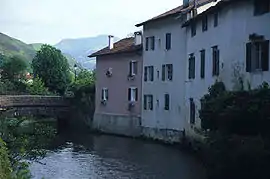 Nive River | |
.svg.png.webp) Coat of arms | |
Location of Aldudes | |
 Aldudes  Aldudes | |
| Coordinates: 43°05′49″N 1°25′28″W | |
| Country | France |
| Region | Nouvelle-Aquitaine |
| Department | Pyrénées-Atlantiques |
| Arrondissement | Bayonne |
| Canton | Montagne Basque |
| Intercommunality | Pays Basque |
| Government | |
| • Mayor (2020–2026) | Martin Suquilbide[1] |
| Area 1 | 23.27 km2 (8.98 sq mi) |
| Population | 324 |
| • Density | 14/km2 (36/sq mi) |
| Time zone | UTC+01:00 (CET) |
| • Summer (DST) | UTC+02:00 (CEST) |
| INSEE/Postal code | 64016 /64430 |
| Elevation | 345–1,000 m (1,132–3,281 ft) (avg. 485 m or 1,591 ft) |
| 1 French Land Register data, which excludes lakes, ponds, glaciers > 1 km2 (0.386 sq mi or 247 acres) and river estuaries. | |
It is located in the former province of Lower Navarre.
The inhabitants of the commune are known as Aldulais or Aldudar.[3]
Geography
Location
The village Aldudes is part of Le Pays Quint[4] (Kintoa in Basque or Quinto Real in Spanish). The commune is an area of pasture belonging to Spain but cultivated by French farmers.
It is located in the Aldudes valley on the banks of the Nive des Aldudes in the Basque province of Lower Navarre. It is on the Spanish border some 20 km southwest of Saint-Jean-Pied-de-Port although it can not be directly accessed from there.
Access
Access is by the D948 road from Saint-Etienne-de-Baigorry in the north, which passes through the village then continues south to Urepel. The D58 road goes from the village through the length of the commune before continuing to Spain through Urepel commune. The Spanish border of Navarre forms the southwestern and northeastern borders of the commune.[5]
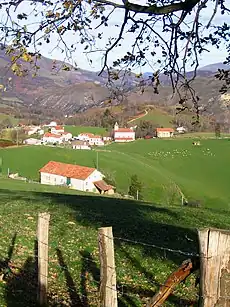
Hydrography
Located in the watershed of the Adour, Aldudes is traversed by the Nive d'Aldudes with its many tributaries, such as the Urbeltch Labiaringo erreka, the Aktieltako erreka, and numerous unnamed streams. Paul Raymond mentioned[6] the Autrin, a stream which rises in Aldudes and joins the Nive des Aldudes.
Localities and hamlets
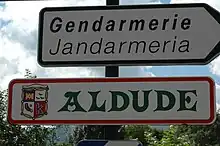
- Abanjo
- Abrakou
- Achtieta
- Aguerréa
- Ahadilépo
- Alachontro
- Alamontcho
- Alasta
- Alastagaraya
- Ametzlépo
- Antonénéa
- Aranbelea
- Arrokia
- Asketa
- Atabala
- Aucho
- Autrin
- Auzkia
- Barbachuri
- Baztanchuria
- Behorsubuztan
- Berha
- Bidartea
- Chabadinénéa
- Chalosa
- Chekalebeherea
- Chekalegaraya
- Chiloénéa
- Chotro
- Chotroenborda
- Domingoénéa
- Egnauténéa
- Elgartéa
- Elhocady[6]
- Elichaga
- Erremedio
- Errienta
- Esnazu[6][7] (or Eznazu, or Esnaratsu on the Cassini Map)
- Etcheberria
- Etchemendia
- Ferranjagaraya
- Hachketa
- Haritzchilo
- Harribeltzia
- Iguxkagerrea (or Iguchkaguerrea[8])
- Joanessénéa
- Joangnakei
- Koche
- Koskartéa
- Koskarteko Borda
- Koskorziloa
- Landart
- Lechaka
- Lekuederra[9] (or Lekuederrea)
- Col de Lepeder[6]
- Luichénéa
- Mahatcheta
- Makurea
- Manechuna
- Marquitchaénéa
- Martinénéa
- Mate
- Meharroztegui (Pass, 738m)[6])
- Menementa[10]
- Miguelartzaina
- Miguelénéa
- Munichta
- Munichtagaraya
- Murruoin
- Nobléa
- Oliopitchar
- Otsachar
- Ohhanburua
- Otsanhaitz
- Oyhanzelhaya
- Paratzelhaï
- Patchiko
- Pilaria
- Pocomotzénéa
- Poko
- Le Pont Romain
- Predotinéa
- Premundoa
- Pritchia
- Sabina
- Salaria
- Sallaberria
- Sarahandia
- Sarahandiko Ithurria
- Sarkindéa
- Semeder
- Soldadoénéa
- Ttattola
- Turrieta
- Uhaldéa
- Urrichka
- Zelhaybeguia
Toponymy
The name of the commune in Basque is Aldude. Aldudes was also the name given to the entire valley bordering the Baigorry Valley and the Spanish border.[6]
Jean-Baptiste Orpustan proposes the construction ald(a)-uhide meaning "the path beside the water".[12] According to Ernest Nègre however, the name Aldudes is a contraction of the basque Aldubide meaning "way to the summits" from the root aldu meaning "heights" and bide meaning "way".[13] The romanisation into Aldudes is actually a plural.
The following table details the origins of the commune name and other names in the commune.
| Name | Spelling | Date | Source | Page | Origin | Description |
|---|---|---|---|---|---|---|
| Aldudes | Alduide | 1193 | Orpustan | Village | ||
| Montes de alduides | 1237 | Mérimée | ||||
| Aldude | 1353 | Mérimée | ||||
| Alduyde | 1374 | Mérimée | ||||
| Alduyde | 1381 | Orpustan | ||||
| Alduyde | 1392 | Orpustan | ||||
| Alduide | 1614 | Raymond | 4 | Camara | ||
| Les Aldudes | 1863 | Raymond | 4 | |||
| Elhocady | Elhocady | 1863 | Raymond | 58 | Redoubt on the Spanish border | |
| Esnazu | Eznazu | 1863 | Raymond | 64 | Hamlet | |
| Le Labiarine | Le Labiarine | 1863 | Raymond | 87 | Hamlet | |
| Lepeder | Lépéder | 1863 | Raymond | 99 | Mountain | |
| Col de Meharroztegui | Col de Méharoztéguy | 1863 | Raymond | 111 | Pass | |
| Col de Phaaçaldéguy | Col de Phaaçaldéguy | 1863 | Raymond | 135 | Pass to Spain | |
| Col d’Urtiague | Col d’Urtiague | 1863 | Raymond | 172 | Pass to Spain |
Sources:
- Orpustan: Jean-Baptiste Orpustan, New Basque Toponymy[12]
- Mérimée: Ministry of Culture Mérimée database: Presentation of the Commune[4]),
- Raymond: Topographic Dictionary of the Department of Basses-Pyrenees, 1863, on the page numbers indicated in the table. (in French)[6]
Origins: Camara: Titles of Camara de Comptos[14]
History
The commune originated in the 16th century when young noblemen of the Baigory family founded the village which, by the ancient Basque succession rule, reserved the legacy of the family house exclusively to the eldest child. The parish was established in 1793.[4]
Heraldry
.svg.png.webp) Arms of Aldudes |
Blazon: Quarterly, first of gules bordered in Or charged with the monogram of the Virgin surmounted by a small cross the same all bordered in azure; second argent 3 wood-pigeons azure 2 and 1; third Or a Lachua glove posed in bend accompanied in sinister chief by a palote the whole proper; fourth gules a majuscule letter K of argent surmounted by a royal crown of Or.[15]
|
Administration
List of Successive Mayors[16]
| From | To | Name |
|---|---|---|
| 1801 | 1808 | Jean Tihista |
| 1808 | 1815 | Jean Ardantz |
| 1815 | 1816 | Jean Uhide |
| 1816 | 1829 | Martin Arrambide |
| 1829 | 1831 | Charles Schmarzow |
| 1831 | 1833 | Salvat Larre |
| 1833 | 1839 | Mathieu Barcelona |
| 1839 | 1848 | Charles Schmarzow |
| 1848 | 1860 | Pierre Mococain |
| 1860 | 1862 | Alfred Saurel |
| 1862 | 1871 | Étienne Ritou |
| 1995 | 2014 | Perio Setoain |
| 2014 | 2020 | Jean-Michel Dendarieta |
| 2020 | 2026 | Martin Suquilbide |
Inter-communality
The commune of Aldudes participates in five intercommunal organisations:
- the Communauté d'agglomération du Pays Basque
- the intercommunal association for the development and management of the slaughterhouse of Saint-Jean-Pied-de-Port
- the joint association of the watershed of the Nive
- the association to support Basque culture
- the energy association of Pyrénées-Atlantiques
Population
| Year | Pop. | ±% p.a. |
|---|---|---|
| 1968 | 718 | — |
| 1975 | 586 | −2.86% |
| 1982 | 483 | −2.72% |
| 1990 | 433 | −1.36% |
| 1999 | 395 | −1.02% |
| 2007 | 376 | −0.61% |
| 2012 | 338 | −2.11% |
| 2017 | 322 | −0.97% |
| Source: INSEE[17] | ||
Economy
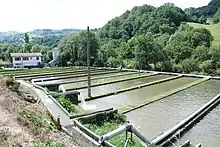
A fish farm is active on the road to Urepel.
Basque pig breeding is an activity in full revival in the Aldudes valley, under the leadership of the Technical Institute of Pork (ITP).
The commune hosts the Ets Pierre Oteiza company (gourmet pork products) which is one of the fifty top agribusinesses in the department.
It is part of the Appellation d'origine contrôlée (AOC) zone of Ossau-iraty.
Culture and heritage
Languages
According to the Map of the Seven Basque Provinces, published in 1863 by Prince Louis-Lucien Bonaparte, the dialect of Basque spoken in Aldudes is western Lower Navarrese dialect.
Laxoa
In 1952 the square in front of the church and the town hall was converted into a playing field for "laxoa". This ancient game of basque pelote is played with leather gloves.
At the entrance porch of the church is the target for the game.
Civil heritage
The commune contains a number of sites that are registered as historical monuments:
- Houses and Farms (18th-19th century)
 [18]
[18] - The Menementa Farm (1827)
 [10]
[10] - The Iguxkagerrea Farm (18th century)
 [8]
[8] - The Joalginenborda Farm (19th century)
 [9]
[9]
- Other sites of interest
- Cromlechs: There are three Harrespils on the Argibel site. These are great circles of stone or "menhirs" for funerary purposes, dated from the 1st millennium BC. The Harrespil are notable due to their number (over 100 registered) and their witness to knowledge of ancient burial rites.
Religious Heritage
The commune has two religious sites that are registered as historical monuments:
- The 'Chapel of the Assumption (1868)
 at a place called Eznazu has been listed on the Inventory of cultural heritage since 21 March 2003.[7] It contains a Retable and Statues (17th century) which are registered as historical objects.
at a place called Eznazu has been listed on the Inventory of cultural heritage since 21 March 2003.[7] It contains a Retable and Statues (17th century) which are registered as historical objects. [19]
[19] - The Parish Church of Notre-Dame (17th century)
 [20] has a rosary which belonged to the Emperor Maximilian.
[20] has a rosary which belonged to the Emperor Maximilian.
- Other religious sites of interest
- Some Hilarri in the cemetery are from the 19th century - two from 1805.
Environmental heritage
- Palombière is the property of the association of the Baigorry Valley. This hunt at 500 metres above sea level was created in 1840 by the mayor of the town, Charles Schmarsow. Reorganized in 1880, it then passed into the hands of the Ospital family who still lead the hunt. The five Filetiers use five pantières or special nets and ten beaters to direct the pigeons to the nets.
Picture Gallery
 Church of Aldudes
Church of Aldudes The Church
The Church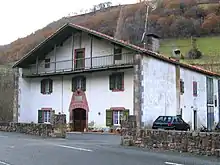 The Bank
The Bank Salting along the Nive
Salting along the Nive The Weir on the Nive
The Weir on the Nive.jpg.webp) The Roman bridge on the Nive
The Roman bridge on the Nive.jpg.webp) The Roman Bridge
The Roman Bridge.jpg.webp) The Roman Bridge
The Roman Bridge The Urepel Bridge over the Nive
The Urepel Bridge over the Nive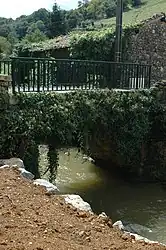 The Urepel Bridge
The Urepel Bridge The Urepel Valley
The Urepel Valley A Basque pig farm
A Basque pig farm The War Memorial
The War Memorial
Facilities
Education
The commune has a private primary school (Mendi-Alde).
Notable People linked to the commune
- Georges Lacombe, born 31 January 1879 in Orthez and died July 1947 in Paris, was a linguist, bascologuue, and Basque French academic. On the eve of the First World War he prepared, with the help of Dr. Jean Etchepare,[21][22] a doctorate in Letters on the Aldudes dialect.
- Bernard Delhom, born in 1885 in Aldudes, was the oldest man in France from 30 December 1995 to 7 February 1996 when he died in Paris aged 110 years and 213 days
- Jean-Baptiste Urrutia, born in 1901 at Aldudes and died in Montbeton, was a missionary in Indochina and Bishop of Huế during the Indochina War and the Vietnam War
See also
Notes
References
- "Répertoire national des élus: les maires". data.gouv.fr, Plateforme ouverte des données publiques françaises (in French). 2 December 2020.
- "Populations légales 2020". The National Institute of Statistics and Economic Studies. 29 December 2022.
- Inhabitants of Pyrénées-Atlantiques (in French)
- IA64000418 Presentation of the commune (in French)
- Google Maps
- Topographic Dictionary of the Department of Basses-Pyrenees, Paul Raymond, Imprimerie nationale, 1863, Digitised from Lyon Public Library 15 June 2011 (in French)
- Ministry of Culture, Mérimée IA64000403 Chapel of the Assumption (in French)

- Ministry of Culture, Mérimée IA64000455 Iguxkagerrea Farm (in French)

- Ministry of Culture, Mérimée IA64000454 Joalginenborda Farm (in French)

- Ministry of Culture, Mérimée IA64000456 Menementa Farm (in French)
- Géoportail, IGN (in French)
- Jean-Baptiste Orpustan, New Basque Toponymy, Presses universitaires de Bordeaux, 2006, ISBN 2 86781 396 4 (in French)
- Ernest Nègre, General Toponymy of France, Librairie Droz, 1990, ISBN 2 600 00133 6, No. 19228 (in French)
- Titles published by don José Yanguas y Miranda - Diccionario de Antiguedades del reino de Navarra, 1840, Pamplona (in Spanish)
- Guy Ascarat Archived November 9, 2013, at the Wayback Machine
- List of Mayors of France
- Population en historique depuis 1968, INSEE
- Ministry of Culture, Mérimée IA64000487 Houses and Farms (in French)
- Ministry of Culture, Palissy PM64000027 Retable and Statues (in French)
- Ministry of Culture, Mérimée IA64000400 Parish Church of Notre-Dame (in French)

- (in Spanish) Centenario de Euskaltzaleen Biltzarra
- "Official website of Euskaltzaleen Biltzarra". Archived from the original on 2010-10-05. Retrieved 2013-08-22.
External links
- Aldude in the Bernardo Estornés Lasa - Auñamendi Encyclopedia (Euskomedia Fundazioa) (in Spanish)
- les Aldudes on the 1750 Cassini Map